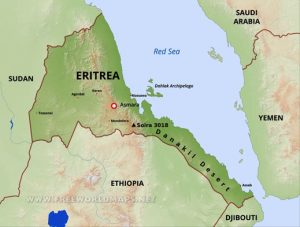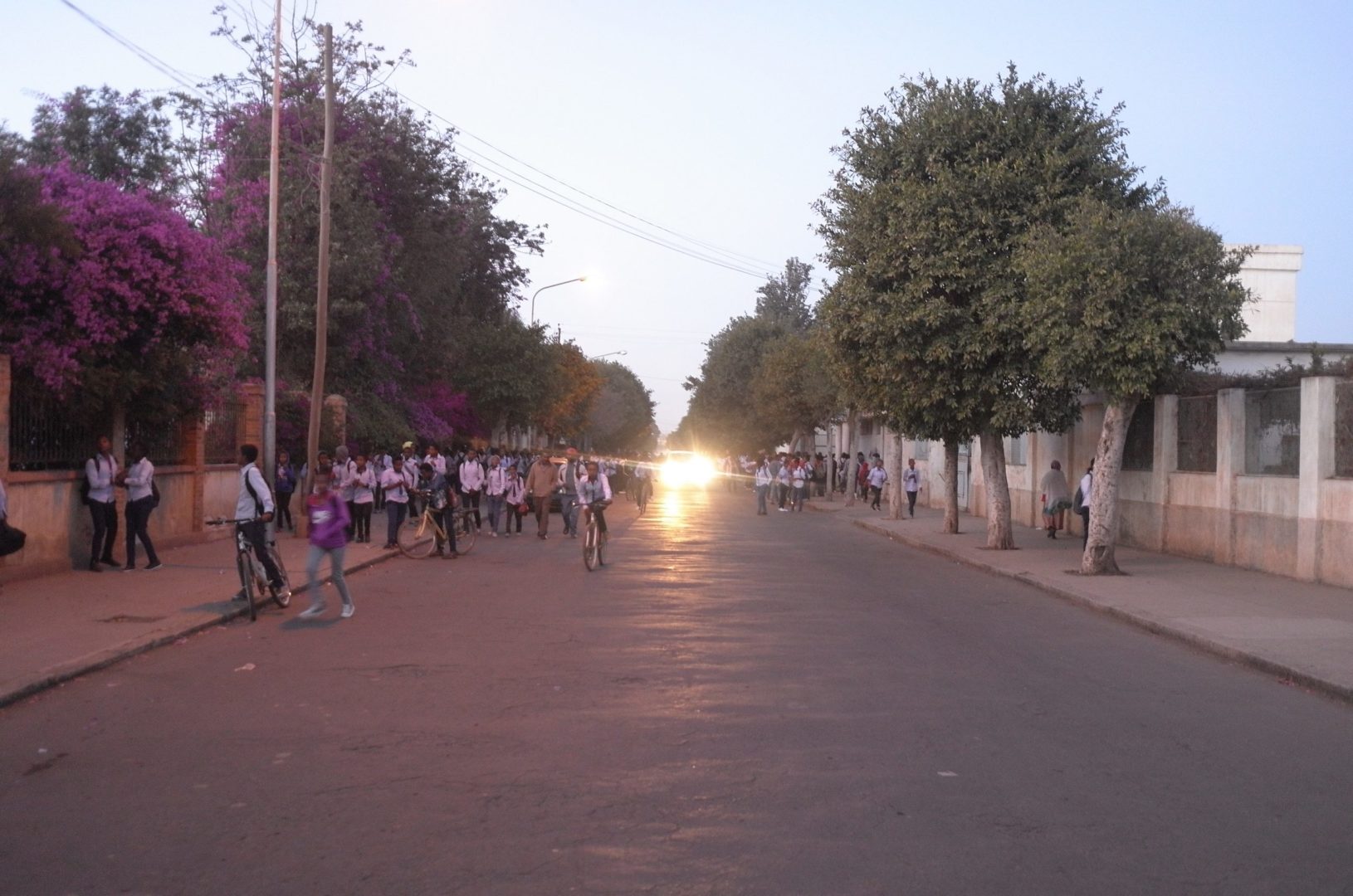11.03.2020
YAKIL! – Enough! – The Call of a New Generation of Young Eritreans (Part 1)
Interviews with Yirgalem Fisseha, Samson Salomon and Bethlehem Isaak
By Susanne Berger (Washington D.C.)
 YIRGALEM FISSEHA, SAMSON SOLOMON, BETHLEHEM ISAAK and MERON ESTEFANOS continue the decades-long struggle of their parents and grandparents for freedom and democracy in Eritrea. They intentionally rely on peaceful means. For the Fritz Bauer Blog we spoke with them and start the series with the
YIRGALEM FISSEHA, SAMSON SOLOMON, BETHLEHEM ISAAK and MERON ESTEFANOS continue the decades-long struggle of their parents and grandparents for freedom and democracy in Eritrea. They intentionally rely on peaceful means. For the Fritz Bauer Blog we spoke with them and start the series with the
Interview with Yirgalem Fisseha…
Isaias Afwerki has ruled Eritrea since the founding of the state in 1993. Afwerki is a former military commander and political commissioner of the Eritrean Liberation Front (ELF, later Eritrean Peoples’ Liberation Front, EPLF), which led the fight for Eritrea’s independence from Ethiopia. At that time, there was great hope that Eritrea would introduce a democratic system of government. In 1996, the Eritrean government enacted a so-called Press Proclamation Law, which allows private ownership of print media
In the 1990s, however, Afwerkis’ rule became increasingly autocratic. In 1997 the Eritrean National Assembly ratifies Eritrea’s constitution, but it is never officially implemented. In early 2001, a group of prominent Eritrean politicians and government ministers expressed public criticism and concern about how President Afwerki was ruling the country. This group later becomes known as the “G-15”. In a series of open letters they demand that elections be held – as promised – and that the constitution come into force. They express their deep concern about the ongoing border war with Ethiopia. Despite threats and growing risks to their own security, journalists regularly report on these demands in the Eritrean medi
On 18 September 2001, the Eritrean authorities ordered the closure of eight private newspapers. These include the weekly newspapers Meqaleh, Setit, Tsigenay, Zemen, Wintana and Admas. Mass arrests of journalists and members of the government followed, which lasted for years.

For almost twenty years now, Eritrea has been one of the most repressive regimes in the world. A whole generation of Eritrea’s intellectual elite has been brutally and systematically exterminated – lawyers, journalists, politicians, engineers, IT specialists, physicians and artists. The world has paid little attention to these serious crimes.
Thousands of Eritreans have fled their homeland. Those who remain are obliged to do an indefinite, compulsory national service, which is poorly paid and offers practically no opportunities for advancement. Freedom of expression and assembly, the right to vote and other civil rights have been completely abolished. An electoral law is passed in 2002, but official elections never take place. Eritreans are subject to arbitrary arrest and long periods of detention without charge, trial or access to effective legal assistance to challenge these violations of their fundamental rights.
Article and interviews: Susanne Berger (Washington D.C., USA)
Film: Jakob Gatzka (Vierkirchen, Germany)
Photo: Header picture ©Martin Schibbye, Future of Eritrea, Students going home from school in Asmara, Eritrea<
Among those detained since 2001 were
Ogbe Abraha – General, former Commander-in-Chief of the Eritrean Defence Forces, then Minister of Foreign Trade and Security. He later served as Minister of Social Affairs.
Dawit Isaak – Swedish-Eritrean journalist and author. Co-founder of the newspaper Setit, which published the open letter of the “G-15” in 2001. Isaak has been in prison for 18 years, without charge or trial. He is denied any legal assistance and medical care. He has no contact with the outside world, neither with his family nor with representatives of the Swedish embassy. Dawit Isaak, an EU citizen, is now one of the world’s longest imprisoned journalists.
Seyoum Tsehaye – journalist and co-founder of Eritrea’s first state television – and radio station. He has been in prison for 18 years, without charge or trial and without contact with the outside world.
Petros Solomon – Eritrea’s former Defense Minister and later Foreign Minister (1994-1997) was arrested in 2001.
Aster Yohannes – The wife of Petros Solomon was arrested at Asmara airport in December 2003 on her return to Eritrea. She had previously been officially assured that she was not in any danger. The four children of Aster and Petros Solomon have been living in exile ever since.
Haile Woldensae – Petros Solomon’s successor as Foreign Minister. He allegedly died in prison.
Solomon Habtom – director of telecommunications. He died in 2017 in Carcheli prison in Asmara, after 14 years of imprisonment. He had no contact with his family since 2003.
Ciham Ali Ahmed – the then fifteen-year-old was arrested in December 2012. Since then there has been no trace of her. Chiam Ali has both Eritrean and American citizenship.
The African Commission on Human Rights decided in November 2003 that the members of the G-15 are being held in arbitrary and illegal detention. The Commission called on the Eritrean government to release and compensate all those arrested. The Eritrean government ignored the ruling.
The current situation in Eritrea
Report by Daniela Kravetz, UN Special Representative for Eritrea (UN Special Rapporteur), March 2020
Reply by Tesfamicael Gerfahtu, Eritrea’s Ambassador to the UN, March 2020
Quote: “YAKIL! – We’ve had enough! – The call of a new generation of young Eritreans. Interviews with Yirgalem Fisseha, Samson Solomon and Bethlehem Isaak by Susanne Berger (Washington D.C.),” in: Fritz Bauer Blog, March 11, 2020, URL: https://www.fritz-bauer-blog.de/admin/en/home/news/yakil-enough-the-call-of-a-new-generation-of-young-eritreans-part-1#/






